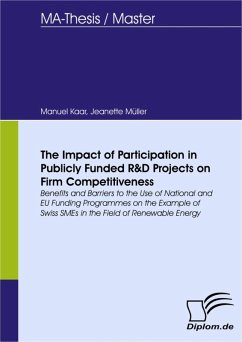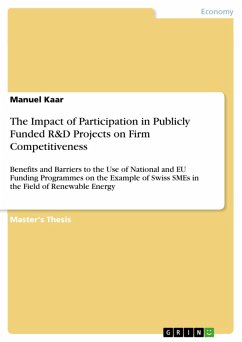Inhaltsangabe:Introduction: Never before in history has global demand for energy been stronger than today. While exhaustible resources such as oil, gas, and coal are expected to remain the world¿s primary basis of energy generation in the near future, alternative resources like biomass, solar, or wind energy are predicted to grow significantly in importance (e.g. International Energy Agency, 2009). The strong global energy demand, together with rising costs of finding and exploiting fossil fuels, has contributed to a considerable increase in public awareness for the energy supply issue in recent years, and thus also to an acceleration of the investments and developments in the field of alternative resources. Yet, in order to achieve a fundamental shift away from exhaustible resources on a long-term basis, creative innovations and new technology solutions for renewable energy production are vital. The basis for the successful development and commercialisation of such new technologies is effective research and development (R&D) work by companies, universities, and other organisations. Small and medium-sized enterprises (SMEs) take on a special role in this respect. The majority of European companies are SMEs if measured by the EU criteria (EC DG Research Communication Unit, 2010a, p. 6), that is, they have less than 250 employees, and an annual turnover and/or balance sheet total lower than EUR 50 million and/or EUR 43 million, respectively. The large number of SMEs in Europe implies that there is a high diversity, and thus also a vast potential for innovation, in these organisations. Nevertheless, in most countries, including Switzerland, the bulk of research in the private sector is undertaken by larger businesses. In Switzerland, R&D by SMEs (SFSO definition, i.e. firms with less than 100 employees) accounted for only 16% of total in-house R&D spending in 2008, although some 99% of Swiss companies are categorised as SMEs (SFSO, 2010, p. 9). In addition, many smaller companies do not engage in R&D at all, as they simply do not possess the necessary resources. These facts lead to a situation where much potential for innovation in smaller firms remains unused. Providing SMEs with the opportunity to engage in publicly funded R&D projects offers one way to tap into this potential for innovation that would otherwise continue to lie idle, and is therefore highly reasonable from a policy point of view. At the same time, participation in such projects [...]
Dieser Download kann aus rechtlichen Gründen nur mit Rechnungsadresse in A, B, BG, CY, CZ, D, DK, EW, E, FIN, F, GR, HR, H, IRL, I, LT, L, LR, M, NL, PL, P, R, S, SLO, SK ausgeliefert werden.









